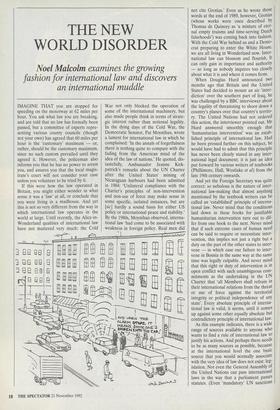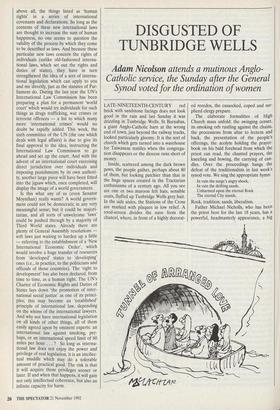THE NEW WORLD DISORDER
Noel Malcolm examines the growing
fashion for international law and discovers an international muddle
IMAGINE THAT you are stopped for speeding on the motorway at 62 miles per hour. You ask what law you are breaking, and are told that no law has formally been passed, but a committee of experts repre- senting various county councils (though not your own) has agreed that 60 miles per hour is the 'customary' maximum — or, rather, should be the customary maximum, since no such custom prevailed until they agreed it. However, the policeman also informs you that he has no power to arrest you, and assures you that the local magis- trate's court will not consider your case unless you volunteer to be tried by it.
If this were how the law operated in Britain, you might either wonder in what sense it was a 'law' at all, or conclude that you were living in a madhouse. And yet this is not so very different from the way in which international law operates in the world at large. Until recently, the Alice-in- Wonderland qualities of international law have not mattered very much: the Cold
War not only blocked the operation of some of the international machinery, but also made people think in terms of strate- gic interest rather than notional legality. In the dying days of the Cold War, the Democratic Senator, Pat Moynihan, wrote a lament for international law in which he complained: 'In the annals of forgetfulness there is nothing quite to compare with the fading from the American mind of the idea of the law of nations.' He quoted, dis- tastefully, Ambassador Jeanne Kirk- patrick's remarks about the UN Charter after the United States' mining of Nicaraguan harbours had been admitted in 1984: 'Unilateral compliance with the Charter's principles of non-intervention and non-use of force may make sense in some specific, isolated instances, but are [sic] hardly a sound basis for either US policy or international peace and stability.' By the 1980s, Moynihan observed, interna- tional law 'had come to be associated with weakness in foreign policy. Real men did
not cite Grotius.' Even as he wrote those words at the end of 1989, however, Grotius (whose works were once described by Thomas de Quincey as 'a mixture of eter- nal empty truisms and time-serving Dutch falsehoods') was coming back into fashion. With the Cold War behind us and a Demo- crat preparing to enter the White House, we are all living in Wonderland now. Inter- national law can blossom and flourish. It can only gain in importance and authority — so long as nobody inquires too closely about what it is and where it comes from.
When Douglas Hurd announced two months ago that Britain and the United States had decided to mount an air 'inter- diction' over the southern part of Iraq, he was challenged by a BBC interviewer about the legality of threatening to shoot down a country's planes over that country's territo- ry. The United Nations had not ordered this action, the interviewer pointed out. Mr Hurd answered smoothly enough that `humanitarian intervention' was an estab- lished principle of international law. Had he been pressed further on this subject, he would have had to admit that this principle has never been clearly stated in any inter- national legal document; it is just an idea put forward by various writers of textbooks (Phillimore, Hall, Westlake et al) from the late 19th century onwards.
And yet the Foreign Secretary was quite correct: so nebulous is the nature of inter- national law-making that almost anything mentioned by the textbook writers can be called an 'established' principle of interna- tional law. Never mind that the conditions laid down in these books for justifiable humanitarian intervention turn out to dif- fer from one book to the next. Never mind that if such extreme cases of human need can be said to require or necessitate inter- vention, this implies not just a right but a duty on the part of the other states to inter- vene — in which case our failure to inter- vene in Bosnia in the same way at the same time was legally culpable. And never mind that this right or duty of intervention is in open conflict with such unambiguous com- mitments as the undertaking in the UN Charter that 'all Members shall refrain in their international relations from the threat or use of force against the territorial integrity or political independence of any state'. Every absolute principle of interna- tional law is valid, it seems, until it comes up against some other equally absolute but contradictory principle of international law.
As this example indicates, there is a wide range of sources available to anyone who wants to find a rule of international law to justify his actions. And perhaps there needs to be as many sources as possible, because at the international level the one basic source that you would normally associate with the very idea of law does not exist: leg- islation. Not even the General Assembly of the United Nations can pass international laws in the way that a parliament passes statutes. (Even 'mandatory' UN sanctions against arms sales to Iraq, for example, would not have enabled anyone to prose- cute Matrix Churchill for breaking interna- tional law. The firm could only have been prosecuted, as it was, for breaking British national law about applications for export licences from the DTI.) Instead, there are four sources of inter- national law, which are set out in the con- stitution of the International Court of Justice: a) 'international conventions . . . establishing rules expressly recognised by the contesting states'; b) 'international cus- tom, as evidence of a general practice accepted as law'; c) 'the general principles of law recognised by civilised nations'; d) Judicial decisions and the teachings of dis- tinguished international lawyers. This last category, however, can be used only 'as subsidiary means for the determination of rules of law' — which has the surprising consequence that there is, strictly speak- ing, no such thing as case-law at the inter- national level, and that the decisions of the International Court itself have no more authority in settling later disputes than the opinions expressed by professors in their textbooks. Category (c) is seldom invoked nowadays, since the distinction it makes between 'civilised' and 'uncivilised' nations — using phrasing first drafted in 1920 — is thought to be invidiously elitist or ethno- centric. A ghost of this distinction survives, however, in today's prim rhetoric about the international community', a club from which some states may apparently be blackballed. So that leaves us with conven- tions (i.e. formal voluntary agreements) and custom.
In theory, these two sources of law are Very different. A convention is a type of treaty, and a treaty cannot make new laws; It can only make new obligations between the countries which sign the treaty. Cus- tom, on the other hand, does not make new laws either; it is a matter of how coun- tries have usually behaved in accordance with what they thought the old laws were. So, by the cold light of reason, it looks as if neither of these sources can actually give rise to new laws. And yet, especially in the period since the second world war, a strange and increasingly giddy pas de deux between these two sources has produced a huge quantity of new international laws of apparently universal validity.
The method involves putting together large multilateral conventions (usually under the auspices of the United Nations), and getting at least a few dozen countries to sign and ratify them. At this point a sort of conceptual conjuring trick is performed: the convention is described no longer as a voluntary agreement between those coun- tries to act in certain ways, but rather as a statement of the principles of customary international law (even if they have never been stated in that way before), which must therefore be equally binding on all countries whether or not they have both- ered to sign the convention. In the words
of one distinguished lawyer (Bin Cheng, Emeritus Professor at London University), `international customary law requires only one single constitutive element, namely, the opinio juris [i.e. the opinion that it is law] of states', and this may develop so quickly that an 'instant' customary law is born. Hey presto! Taken to its logical con- clusion, this means that the international convention itself is superfluous: the moment that the legal experts sitting in their drafting committee in New York or Geneva decide that something should be the law, it is the law.
And if legal experts can perform this simple conjuring trick (not making law, oh no — just declaring what the law is), why not the diplomats in the UN General Assembly too? Although under its Charter the General Assembly has no legislative authority and can only 'make recommen- dations for the purpose of encouraging the development of international law and its codification', the practice has grown up of regarding many of its resolutions as 'soft law', which may rapidly harden into the real thing. Or, to use the other favourite metaphor of the lawyers, these resolutions are `crystallisations' of the principles of international law which are already con- tained in the UN Charter itself. Whatever the metaphor, the meaning is this: interna- tional legislation by stealth.
So, if enough suitable people think that a rule is sufficiently good or important to be described as a law, they can insist that it is one. There are no clear criteria for deciding just how good or important the rule has to be in order to qualify for this privilege. On the whole, the things which have been elevated into 'law' in this way have indeed been good and important — above all, the things listed as 'human rights' in a series of international covenants and declarations. So long as the contents of these new international laws are thought to increase the sum of human happiness, no one seems to question the validity of the process by which they come to be described as laws. And because these particular new laws concern the rights of individuals (unlike old-fashioned interna- tional laws, which set out the rights and duties of states), they have in turn strengthened the idea of a sort of interna- tional legislation which can apply to you and me directly, just as the statutes of Par- liament do. During the last year the UN's International Law Commission has been preparing a plan for a permanent 'world court' which would try individuals for such things as drugs trafficking, war crimes or terrorist offences — a list to which many more 'international crimes' would no doubt be rapidly added. This week, the sixth committee of the UN (the one which deals with legal affairs) is due to give its final approval to the idea, instructing the International Law Commission to go ahead and set up the court. And with the advent of an international court exercising direct jurisdiction over individuals and imposing punishments by its own authori- ty, another large piece will have been fitted into the jigsaw which, once completed, will display the image of a world government.
Is this what any of us (even Senator Moynihan) really wants? A world govern- ment could not be democratic in any very meaningful sense; but it could be majori- tarian, and all sorts of unwelcome 'laws' could be pushed through by a majority of Third World states. Already there are plenty of General Assembly resolutions soft laws just waiting to harden up a little — referring to the establishment of a 'New International Economic Order', which would involve a huge transfer of resources from 'developed' states to 'developing' ones (i.e., in practice, to the politicians and officials of those countries). The 'right to development' has also been declared, from time to time, as a human right. The UN's Charter of Economic Rights and Duties of States lays down 'the promotion of inter- national social justice' as one of its princi- ples; this may become an 'established' principle of international law, depending on the whims of the international lawyers. And why not have international legislation on all kinds of other things, all of them easily agreed upon by eminent experts: an international law against smoking, per- haps, or an international speed limit of 60 miles per hour . . . ? So long as interna- tional law does not enjoy the power and privilege of real legislation, it is an intellec- tual muddle which may do a tolerable amount of practical good. The risk is that it will acquire those privileges sooner or later. If and when that happens, it will gain not only intellectual coherence, but also an infinite capacity for harm.












































































 Previous page
Previous page